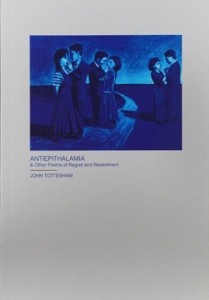An Interview With John Tottenham
 I met John Tottenham at a party hosted in an arcade in March 2012. He approached my friend and asked for a beer from the case she was carrying under her arm. “Let me have one of those,” he said in his British accent. She looked over to me, rolled her eyes and begrudgingly handed him one. “Yes, thanks,” he muttered, pivoting quickly to wander away.
I met John Tottenham at a party hosted in an arcade in March 2012. He approached my friend and asked for a beer from the case she was carrying under her arm. “Let me have one of those,” he said in his British accent. She looked over to me, rolled her eyes and begrudgingly handed him one. “Yes, thanks,” he muttered, pivoting quickly to wander away.
“What an asshole,” my friend mumbled.
I later saw him standing in a dark corner, alone, his eyes half-drawn, leaning on a pinball machine. He looked absolutely miserable. I laughed to myself. His display soothed my own misery. I had been looking for a way home since I arrived.
Six months later, John’s second collection of poetry – Antiepithalamia: And Other Poems of Regret & Resentment – was released on my press, Penny-Ante Editions.
I spoke with John via email.
***
Rebekah Weikel: Your work seems to be embraced by people who don’t normally read poetry.
John Tottenham: Which automatically dooms it to obscurity. All poetry, of course, is automatically doomed to obscurity, but to produce work that is accessible is to make it inaccessible to critics. It leaves them with nothing to do. And the critic has pulled off the outrageous feat of raising himself to the level of the artist and somehow making himself indispensable. But if there’s a direct line between poet and reader, then the critic becomes irrelevant, it could drive them out of business. Clarity is also anathema to people who are steeped in critical theory. The waters must be muddied to make them appear deeper, to give the serious readers and theoreticians something to fish for. Critical theory is a lot of fun but that’s all it is, fun: precisely what it’s supposed to not be. It’s a game for the overeducated. Nobody’s going to go there for wisdom, guidance, solace.
RW: You often write in the first person, but there’s also a contradictory quality.
JT: That’s due to the thorny issue of the unreliable narrator in poetry. It’s something one can get away with in prose – which, for example, Nabokov and Iris Murdoch do very well. But it’s difficult with poetry. People automatically assume that if you’re writing in the first person, you’re being confessional, especially if you’re addressing matters of the heart. I never sit down with the intention of writing a poem about anything or anybody in particular. The way I work is more like surgery or sculpture – a long process of accumulating notes, then chipping away, taking apart, piecing back together.
